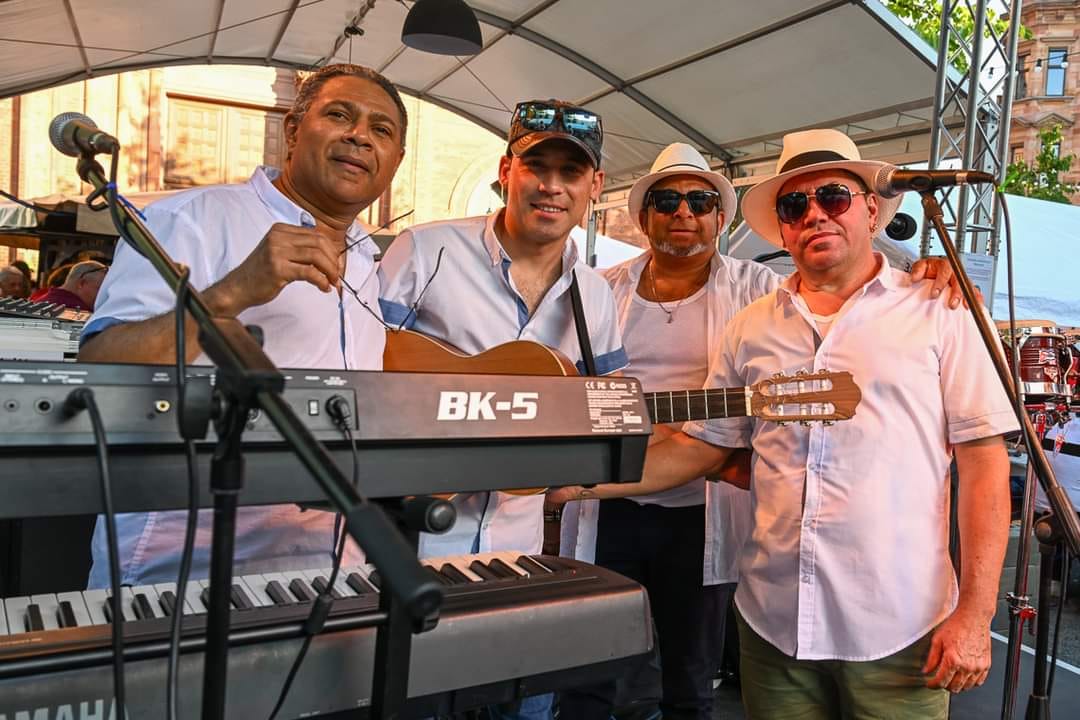Latino bands have been around Germany since the start of the salsa wave in the 2000s in larger numbers. Even before, Germany always had a close connection with Latin American music and in the 1920s, Berlin was one of the most important places to dance tango and create tango music in the world.
Many musicians from Cuba have settled in Germany and give regular concerts especially in the summer period with many open air events and events co-organized by cities. These bands often have a wide repertoire including many salsa classics and greatest hits.
There are also many locally formed bands in Germany that create salsa music. Again, most opportunities to see these groups are during the summer period and at government sponsored outdoor festivals.
Los 4 del Son performing in Wiesbaden
Local Latin Music bands in Germany
There are hundreds of Latin bands that live and perform mostly in Germany and dozens of international performers that come to Germany sometimes. Overall, Germany has attracted many great salsa musicians, but live music is not that common in the dance scene, especially compared to places like Havana, Miami or Cali where many clubs have bands playing.
In the following, I want to introduce bands that have gathered a small following in Germany, where they are based. Many of these bands perform mostly in summer months and are active in their local areas like the Berlin area, the Munich area or the RheinMain area.
Los 4 del Son
Los 4 del Son, based in Wiesbaden, is an ensemble of dedicated musicians known for their vibrant renditions of classical and contemporary latin tracks. The group members from Cuba use their talents to create sounds that resonate with fans and get them dancing.
Their repertoire typically encompasses a range of songs that showcase their versatility. From timeless Latin standards to modern salsa hits, Los 4 del Son captivates audiences with their passion and precision. Songs they like to play include Chan Chan of the Buena Vista Social Club or Guantanamera. Their performances attract a core group of 10-20 Latinos who live in the wider RheinMain area as well as many of the local dancers and people curious about Latin music.
Grupo Sal
Grupo Sal is a flexible coordination of musicians from Latin America and Europe that play latin American music and engage in social projects there and in Africa. The group is extremely versatile in terms of music, styles but also members. The most important form is the Grupo Sal Duo and the Grupo Sal Sextet. Over the years, Grupo Sal has collaborated with dozens of musicians. Hence, it is impossible to pin down this group in terms of musical style and members.
So what is Grupo Sal? It is a social critical organization with development cooperation projects and at the same time this work and discussions are put into music and jam sessions with different constellations of musicians.
Playa Canela
A three people band based in the RheinMain area. Milena, the singer from Bogota, Colombia gets the crowd moving and makes sure there is no lack of famous Colombian songs to be played. Percussion is played by another Colombian and Lutz Lehmler is on the guitar.
This small group is incredibly versatile and goes well beyond the classical musical performance. Lutz transforms his guitar more often than not into a percussion instrument and Milena plays a Kazoo – which might be a first in the Latin music genre in Germany.
Playa Canela had many performances in the summer of 2023 in the RheinMain area. German speakers can check out this little article in local German press describing Playa Canela at a vineyard in 2022.
Some of the songs include the fan favorites like Somos Dos – Bomba Estereo. Or from the same group “To my Love”. Besides these modern Latin pop songs, Playa Canela plays own songs and songs from around the latin world. For example Argentinian reggae.. Why not!
Playa Canela – performing at Mainzstrand (Mainz)
Mama Limón
Mama Limón is a Darmstadt based music group that performs mostly salsa and related songs. They also play many happy Caribbean vibes, cumbias and Latin pop. Check out Zukaina!
Obviously, they rock the greatest hits, but they also have their own compositions! In the summer of 2023 the band was very active in the Frankfurt area playing some outdoor concerts. Follow Mama Limon on their Facebook page and listen to them on Soundcloud.
Why are there so few Latin bands at salsa festivals in Germany?
At salsa festivals, it is rather uncommon to have bands perform. This is mainly due to economic considerations as organizing a festival is a low margin activity. Usually a one evening 1-2 hour session of a 3-6 member Latino band costs about 500 to 3000 Euros. A cost that only large festivals can master.
Why is there almost no live Kizomba music?
Kizomba is a music and dance from Africa that is becoming increasingly popular in Europe. In terms of live music, that is not the case. The reasons are: for one, it is similar to bachata incorporating a lot of elements of electronic music. Hence, the role of a DJ is very important in comparison to live musicians. Second, there is a lot less money paid for kizomba musicians as it is rather a niche music and dance with a rather young following that has less to spend. Contrast that with the spending power of Tangolovers and you understand why there are many Tango concerts but almost no Kizomba concerts. And third, the latino bands are not familiar with Kizomba. Many musicians in Europe and Germany in particular are from Cuba, some from Colombia and other places. They usually have a wide repertoire ranging from Salsa to Son, from Merengue to Cumbia and sometimes even Latin pop, reggae or bachata. Kizomba is not well known in Latin America.
Finally, the Kizomba dance scene is very much a part of the salsa and bachata dance scenes, but at the same time often in a separate room if a large club or festival has several stages.
Typical instruments in Latin Bands
In salsa bands, the blend of instruments creates the genre’s signature rhythmic and melodic complexity. The core often includes congas, timbales, and bongos—percussion instruments integral to the Afro-Cuban sound. Congas are played with the palms and fingers, creating deep resonant tones, while timbales involve sticks for a crisper sound. Bongos, smaller and higher-pitched, add texture. Many percussionists are multi-instrumentalists, seamlessly switching between these and other instruments like the clave, cowbells or maracas. Brass instruments like trumpets and trombones are common, as are piano and bass guitar. Singers often pull double duty, playing an instrument alongside their vocal responsibilities, adding to salsa music’s rich, layered quality. Find out more on our article about salsa instruments.
How many members in a typical Latin music band?
Most of the Latin bands that perform in Germany are relatively small. Again, this is due to economic reasons and it is just hard to coordinate a larger band. Playa Canela performs with just three musicians and sometimes they add a bit of self-recorded music to their performances so it will sound bigger. Other bands do have 5-8 musicians. It is however uncommon to see a Cuban big band in Germany.
Another reason is that many concerts in Germany require travel to different places. From one side of Berlin to the other or to several small wine towns around the RheinMain area. To my knowledge, there is no salsa house band currently in Germany regularly performing for 2 or 3 times per week in a club. This is where Miami, Havana and Cali shine!
Where to go for live latin music in Germany
In Berlin, many of these dances take place in the western part of the city like Breitscheidplatz. In the west of Germany, many wine festivals invite Latin bands to perform and also the Museumsuferfest in Frankfurt is a good opportunity to listen to live Latin music.
More important than where to go is when to go: In summer. You will have a lot more opportunities to listen to Latin bands than in the winter months. The mood is better, people are dancing and the bands engage with the audience. Plus: Many of the concerts in summer are outdoor and free, as they are part of local government sponsored festivals.


